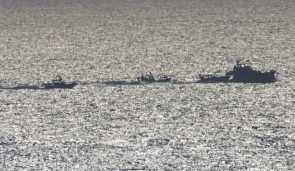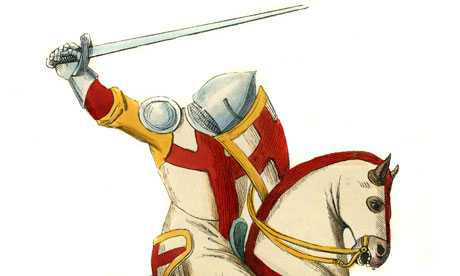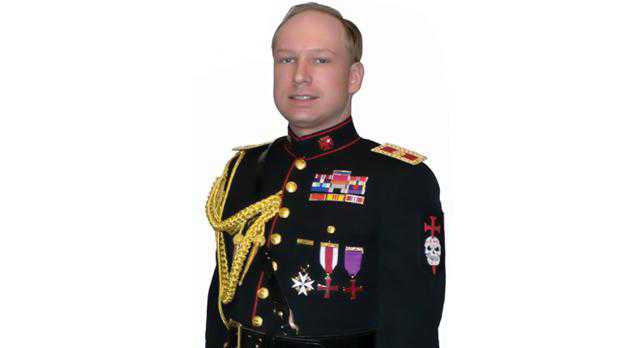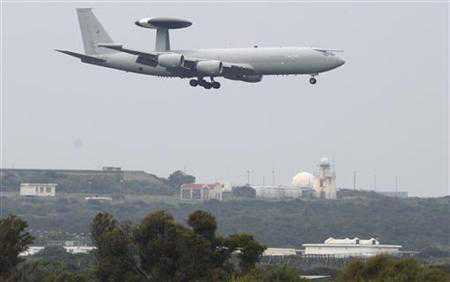After 37 years, Turkey remains the world’s only country to recognize Turkish Cyprus or do business with it; but Prime Minister Erdogan is already planning a new campaign to encourage world recognition if an upcoming round of talks with the Greeks does not lead to a resolution of the island’s division.

By Zvi Bar’el
KYRENIA, CYPRUS – A white marble tablet, marked with the passage of time, stands at the entrance to the mass grave on the outskirts of the village of Murataga in Northern Cyprus. Engraved on it are the words of Archbishop Makarios III, the first president of Cyprus, who in 1964 said: “If Turkey comes to save the Turkish Cypriots, it will not find a single Turkish Cypriot whom it will be able to save.” Eighty-nine of the residents of the village, nearly all of them children, women and elderly people, were not saved from the slaughter carried out by Greek Cypriot soldiers before the Turkish army decided to invade the island on July 20, 1974, in order to thwart the ambition of the ruling military junta in Greece to annex the island to that country.
Kamil Maric, an impressive man of 64 wearing a T-shirt and baseball cap, was 27 at the time, a prisoner of the Greek Cypriot forces, some of whose colleagues had murdered his wife and 18-month-old son.
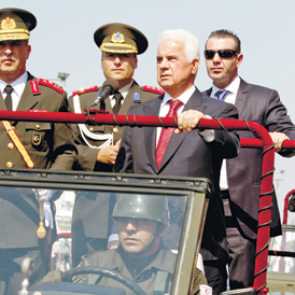
- Turkish Cyprus President Eroglu. Photo by: AFP
“They took 40 bullets out of the boy’s body,” he tells the group of journalists who were invited recently to visit the Turkish part of Cyprus. The occasion was the 37th anniversary of what is called “the Turkish intervention” or “peace mission” there, and in the southern part – invasion and occupation. Back then 150 Turkish Cypriots lived in Murataga, which was surrounded by Greek villages. Most of them were murdered; a few fled to Famagusta or other villages. “Only one couple, he was blind and she was crippled, remained to tell about the horror,” says Maric.
And what happened to the Greek villages? The locals don’t talk about it now. In Northern Cyprus there is only one tragedy. In the south they tell a different story.
Turkey is not only the “motherland” of the approximately 250,000 Turkish Cypriots: It is also their only link with the rest of the world, since no country apart from Turkey recognizes the independence of Turkish Cyprus. Whereas about 135 countries are prepared to grant the Palestinians recognition of an independent state, Turkish Cyprus comes up against a wall every time it seeks recognition.
At Ercan Airport near Lefkosa (which the Greeks call Nicosia ), named after a Turkish combat pilot, the tourist can ask the immigration official not to stamp his passport upon entry, and instead stamp a piece of paper they call a visa. Turkish Cyprus is aware of the difficulties such a stamp could cause a passport-holder, if he wants, for example, to visit Greek Cyprus (the Republic of Cyprus ). Ordinary letters from abroad to an inhabitant of the northern part of the island are sent only via Turkey, ships do not anchor in the ports of Northern Cyprus and no non-Turkish plane lands there.
“We pay double customs duty and the cost of living here is disproportionately high,” says Rasih Resat, owner and editor of the Haberdar newspaper in Northern Cyprus. Resat speaks English like an Englishman, and has a wry sense of humor and a cynicism ostensibly acquired over many years of frustration. “Merchandise coming from Europe has to go through a Turkish port, where they charge customs duty on it, and then it comes here to Cyprus, where we charge customs duty on it again.”
The minimum wage in Turkish Cyprus is higher than that in Turkey, about $750 a month. When all exports from the island have to pass through Turkey to reach world markets, thereby making products more costly, it is hard to find even Turkish investors who will agree to build factories in Northern Cyprus.
“What is left for a Turkish Cypriot manufacturer to do?” asks Resat, and answers: “He can manufacture 150 containers of yogurt and no more, because there is no one to sell to, and he can’t aspire to produce more, to expand his production for the international market. In fact we are going into the third generation of Turkish Cypriots that can’t predict its future. We invest in ourselves, we buy a villa, we buy a BMW – and we keep to ourselves.”
The only source of optimism for Resat is Europe’s demographic trends, he says: “Europe is growing older, and in a few years there will not be enough workers to maintain its industry. It will need more foreign workers [who will send their earnings home] and maybe then there will be an opening for our future.” Until then, Turkey will continue to provide about one-third of the Turkish Cypriot budget, approximately $400 billion annually.
‘Our tomorrow is one’
We meet in the lobby of the Jasmine Court Hotel on the beach at Kyrenia, the beautiful city where the Turkish forces landed in 1974. The previous day, Resat was invited along with a group of journalists to a meeting in Ankara with Turkish Prime Minister Recep Tayyip Erdogan. Erdogan – who two days later came to Cyprus as the guest of honor at the celebrations to mark the anniversary of the Turkish “intervention” – wanted to transmit a message to the effect that if there is no progress in the talks between Greek Cyprus and Turkish Cyprus at the meeting planned at the United Nations in October, he will move to Plan B: enlisting international support for recognition of Turkish Cyprus as an independent state.
“Our yesterday is one, our tomorrow is one and our heartbeat is one,” says the slogan at the bottom of the huge portraits of Erdogan that decorated the streets in advance of the anniversary. Large Turkish flags fly alongside the flag of Turkish Cyprus, and pictures of Mustafa Kemal Ataturk, the founder of modern Turkey, hang in government offices and university classrooms. Turkish Cyprus and Turkey also have the same national anthem – the “Independence March.” The words were written by Turkish poet Mehmet Akif Ersoy in 1921, two years before the founding of the Turkish Republic. The opening lines of the anthem’s 10 stanzas are devoted to “our heroic army,” which was victorious in the War of Independence, and the song is full of expressions of love of the homeland, liberty and power. For many long minutes the guests on the platform of honor erected on one of the main roads of Nicosia stand and sing the entire thing.
The president of the unrecognized Turkish Republic of Northern Cyprus, Dervis Eroglu, is greeted by the public with loud cheering as though he were a beloved king. Cypriot generals bedecked with medals and gilded swords belted to their waists, and a large crowd of citizens and journalists rise to their feet and join in the singing of the anthem, amplified through powerful loudspeakers.
An old friend, an important columnist and former editor of a Turkish newspaper, who volunteers to translate the main points of Erdogan’s long speech for me, breathes a sigh of relief when the announcer – an army officer with a deep bass voice – declares the proceedings will begin. “A folk-dance troupe is better than a military parade,” he comments. And indeed, a small group of men and women in traditional dress perform a series of pleasant dances on the burning-hot asphalt in the 40-degree heat, followed by five paratroopers parachuting and landing perfectly across from the platform of honor.
But there is also, of course, a military parade. Hundreds of Turkish soldiers wearing helmets and with packs on their backs march in unison, commandos in blue berets salute the guests of honor, and a few tanks, artillery pieces and even Katyusha-carriers also file past. During the whole parade the 73-year-old president, who has already had two coronary bypass operations, stands erect and honors the thousands of soldiers.
Elmaz, a Turk who moved to Turkish Cyprus seven years ago to earn a living, tells me after the ceremony: “Look how they stand and exalt the Turkish army. Look at how they fawn over the Turks, but they treat me like garbage. They think they are already part of Europe, while we [native] Turks are inferior to them. I came here with my wife and children but they didn’t allow the children to attend school until my wife and I received a residence permit. They know how to take Turkish money but they also know how to stick a knife in our back.”
“There is something in what he says,” confirms a lecturer at the Eastern Mediterranean University, the largest of the six universities in Turkish Cyprus. “We do feel like a single nation, but among us there are those who are more equal and those who are less equal.”
The six universities, attended by about 40,000 students from around the world (the language of instruction for foreign students is English ) are the most important source of income in the local economy. Every foreign student pays $7,500 to $9,000 for a year of studies, and many receive scholarships and housing. The problem is that only 150 universities in the world are prepared to cooperate with and give academic recognition to the universities in Turkish Cyprus.
“Higher education is a matter of right – it shouldn’t be a political issue,” complains the rector of the Eastern Mediterranean University, Prof. Halil Nadiri. He is right, but since Cyprus is a political issue by nature, and Greek Cyprus became a member of the European Union in 2004, the academic struggle of Turkish Cyprus cannot be anything but political.
The Annan plan
“It’s impossible to go on like this,” asserts Resat, the newspaper editor. “The knife is already cutting into the bone,” Erdogan declared in his speech. “We are ready for Plan B,” warned the president of Cyprus. Thus it seems everyone is preparing for the next “critical moment” and opportunity – and yet another “last chance,” similar to those that have arisen since the Cypriot state was founded – that will come in October when representatives of Turkish Cyprus and Greek Cyprus will meet with UN Secretary General Ban Ki-moon to decide on the future of the Turkish part of the island.
Back in April 2004, Ban’s predecessor Kofi Annan proposed a plan on which inhabitants of the two parts of Cyprus voted in a referendum. In essence, it imagined a federal state in which each part of Cyprus would have a government of its own, subordinate to a federal government with a joint presidential council, and a federal supreme court and constitution. Sixty-five percent of the citizens of the Turkish part voted in favor of the plan, and 76 percent of the Greek part voted against.
In any event, the Greek Cypriots had little to lose by objecting to the UN federation plan; in doing so they showed it would not be to their benefit to share the wealth they have accumulated with their poor, infrastructure-deprived Turkish counterparts on the island. The Greek Cypriots also believed that the reparations offered to them by the UN plan for property over which Turks took possession were not sufficient. They assessed that when they became members of the EU, as they did the following month, they would be able to apply to the European Court of Human Rights and demand far higher compensation.
The possibility that a relatively large Turkish army will remain on the island until Turkey is accepted as a member of the EU also does not appeal to the government of Greek Cyprus, in Nicosia, which has demanded the withdrawal of the forces in the near future. And thus, in the absence of real sanctions for voting down the 2004 UN plan, and with EU membership, the Greek Cypriots attempted to settle a historical account with their Turkish foes.
Meanwhile, the EU has spared itself the problems involved in accepting as members an additional population of about a quarter of a million Muslims, and its commitment to the northern part of the island has been a moral one only. Turkey was hoping that a solution to the Cyprus crisis would open a fast track to discussion of its own membership in the EU. Though no such condition has been explicitly stipulated, the question of Cyprus has come up in many forums and has been depicted as a stumbling block that Turkey must eliminate.
Now Turkey will likely try to explain that the EU should content itself with showing appreciation for various good-will efforts made by Ankara, and see it as a worthy candidate, despite the fact that the status of Turkish Cyprus has not changed. Therein lies the hypocrisy of the EU, which declares it is “eager” to solve the problem of Cyprus and at the same time is slowing down efforts to arrive at a solution – because the moment the Cyprus problem is solved, yet another hurdle will be eliminated from the path of Turkey’s entry into Europe. Then it will no longer be a question of only a quarter of a million Muslim Turkish Cypriots, but rather of about 75 million Muslim Turks.
Lessons for Israel
For its part, Israel also does not recognize Turkish Cyprus as an independent state. Indeed, Jerusalem has adopted the international rhetoric that describes Turkish Cyprus as existing on occupied territory, and of being responsible for finding a solution to its status within the framework of the existing situation on the ground on the island, or as part of an agreed-upon resolution at the UN. This view has not impeded several dozen Israeli businesspeople from investing in the northern part of the island and opening a number of tourism sites there.
In any case, Turkey – as an occupying, invading, liberating country vis-a-vis Cyprus – can teach Israel a lesson when it comes to dealing with abandoned property. The shoreline along the blue sea at Famagusta, with its colorful parasols and vacationers paddling in the water, is crossed by a scary barbed-wire fence behind which is a tall iron wall preventing entry into the ghost town of Varosha. Beyond the wall, on which Turkish soldiers are stationed to prevent the entry of outsiders, are visible high-rise residential buildings, what once was the Sheraton Hotel, and even parts of tree-lined neighborhoods. The Greek inhabitants of Varosha abandoned it in a panic when the Turkish army arrived. There are stories of inhabitants even leaving behind eating utensils on their tables and towels in their bathrooms.
Turkey decided to keep this town as a “deposit”: not to build a settlement or bring Turkish civilians there. Turkey even invited the Greek inhabitants of the town to return, reestablish their businesses and live there; they refused to do so until a comprehensive solution is achieved.
If a diplomatic solution to the Cyprus problem is found, promises Turkey, the Greek inhabitants will be able to return whenever they want. Until then, the Turkish army will continue to guard the town.
“I am certain that if Israel had occupied the town, it would have turned it into a tourism site or a settlement, about which you would say, ‘This is another fact on the ground, and there is nothing to be done about it,’” laughs Sinan, a Turkish journalist who accompanies the group (and requested that his full name not be published ).
“We are taking every possible step to prove that our intentions are good,” the president of Turkish Cyprus explains to me. “We accepted the Annan plan, we are paying reparations and are prepared to come to a property agreement. But we cannot possibly agree to a provision that says the Greek owners will decide what solution there will be for their [abandoned] property. What will we do with the houses Turkish Cypriots are already living in? We are prepared to pay compensation, but we will not allow the Greek owners to determine that residential buildings should be demolished only because they are the [legal] owners. It is also necessary to consider the people who are living in those buildings.”
The Greek right of return, it emerges, also has its “red lines,” but there is no dispute that such a right exists – yet another lesson that can be learned from Cyprus.
On the way back from Famagusta we pass through Nicosia along the border between the two parts of the island. The narrow streets of the capital, its low buildings, remnants of the attractive colonial architectural design, lovely lemon trees, palm trees and pines – all of this makes one forget for a moment that this is a border of loathing and hatred. Even though Turks can now cross to the other side and vice versa, passage of goods is still prohibited.
A week before our visit a power station on the Greek side blew up and the Turkish Cypriot government hastened to offer to help with the supply of electricity. An agreement was signed, but during our trip, the Greek archbishop‘s harsh view of the subject was published. “It is better,” he ruled, “to live by candlelight than to import electricity from the Turks.” He also called upon Greek citizens not to purchase cheeses and other products from the Turkish side of Cyprus.
Thus, the political conflict between the two parts of the island will perhaps be solved on paper, but how many generations will it take for the difficult memories to be totally forgotten?
www.haaretz.com, 05.08.11
